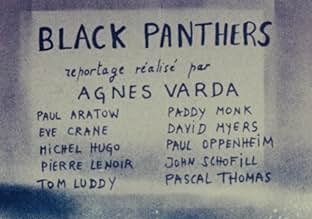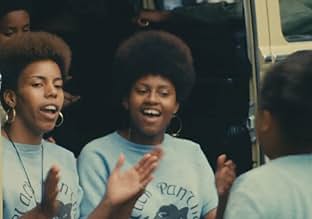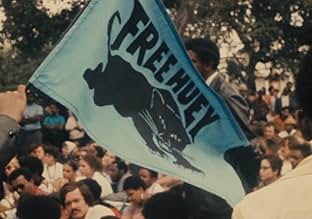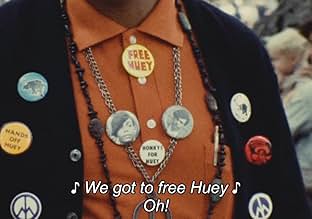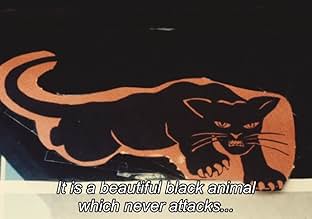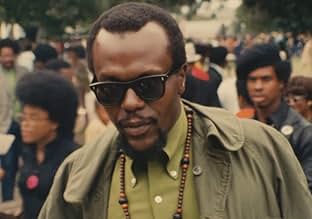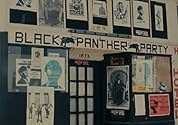VALUTAZIONE IMDb
7,4/10
2947
LA TUA VALUTAZIONE
Un cortometraggio con interviste e proteste a una parata per la liberazione di Huey P. Newton.Un cortometraggio con interviste e proteste a una parata per la liberazione di Huey P. Newton.Un cortometraggio con interviste e proteste a una parata per la liberazione di Huey P. Newton.
H. Rap Brown
- Self
- (non citato nei titoli originali)
Ron Dellums
- Self
- (non citato nei titoli originali)
James Forman
- Self
- (non citato nei titoli originali)
Bobby Seale
- Self
- (non citato nei titoli originali)
Recensioni in evidenza
Bless Agnès Varda for making this short documentary, and for the most part simply allowing members of the Black Panthers to state their views and explain the motivation behind the Black Power movement. The issues are the same as those faced today by the community, and it certainly resonates to hear them speak of stopping the police from killing black people, or of incarceration as being stilted against minorities. The film was made around the time of the Huey Newton trial, and after governor Ronald Reagan had hypocritically overturned California's open carry law once black people started taking advantage of it. Mostly it consists of footage of people at rallies to "Free Huey!," interviews with leaders like Newton and Stokely Carmichael, and comments from supporters. It also includes great commentary from Kathleen Cleaver explaining the significance of black women wearing their hair naturally, in afros.
The film is a snapshot in time during the summer of 1968 which made it fascinating to me, but I wish it had been longer and more fleshed out. It probably should have also asked a critical question or two about the movement looking to Mao Zedong as a role model, given the brutality of his regime and the millions he killed. On the other hand, millions of black people had (and have) died in the system they were in with its widespread racism, so one can understand searching for an alternative, and becoming as assertive as they did when progress didn't just gradually happen. I loved how Varda provided a few moments of gentle narration, explaining to audiences the reasons for what seemed like a dangerous and possibly violent movement. This is well worth a half hour, and something to reflect on over half a century later.
The film is a snapshot in time during the summer of 1968 which made it fascinating to me, but I wish it had been longer and more fleshed out. It probably should have also asked a critical question or two about the movement looking to Mao Zedong as a role model, given the brutality of his regime and the millions he killed. On the other hand, millions of black people had (and have) died in the system they were in with its widespread racism, so one can understand searching for an alternative, and becoming as assertive as they did when progress didn't just gradually happen. I loved how Varda provided a few moments of gentle narration, explaining to audiences the reasons for what seemed like a dangerous and possibly violent movement. This is well worth a half hour, and something to reflect on over half a century later.
I hadn't seen any of Agnes Varda's films until I caught The Gleaners and I a few months ago at a film festival. I loved it, mainly because of Varda's extremely personal aproach to some interesting material and questions. I was recently doing some research on sixties activism when I stumbled across Black Panthers, Varda's 1968 documentary about the Black Panther Party.
The 30 minute long film looks at a rally to free the party's leader, Huey P. Newton. There's no pretense of objectivity -- the Black Panther Party shared in the copyright. Speakers at the rally included Bobby Seale, Stokely Carmichael, and H. Rap Brown, and there's also a short interview with Newton, in prison. Other segments include white people at a firing rage (some of which are children), and members of the police department explaining the gear they carry in the trunks of their cars.
This film documents some of the most important and controverial black leaders of the late 60s, and is a must see for anyone interested in sixties radicalism ot the Panthers.
The 30 minute long film looks at a rally to free the party's leader, Huey P. Newton. There's no pretense of objectivity -- the Black Panther Party shared in the copyright. Speakers at the rally included Bobby Seale, Stokely Carmichael, and H. Rap Brown, and there's also a short interview with Newton, in prison. Other segments include white people at a firing rage (some of which are children), and members of the police department explaining the gear they carry in the trunks of their cars.
This film documents some of the most important and controverial black leaders of the late 60s, and is a must see for anyone interested in sixties radicalism ot the Panthers.
In 1968 the Black Panther Party (BPP) was at its most active and probably its height of popularity. This very brief documentary has several interviews/speeches which give a quick glimpse into what the BPP was demanding. There is footage of Kathleen Cleaver, Stokely Carmichael, and Huey Newton (one of the founders of the BPP). Kathleen and Stokely are two very well-spoken civil rights activists, or freedom fighters if you dare, and that is evident in this short documentary. At the time of this documentary Huey P. Newton, , was locked up for getting into a shootout with police. There is a little commentary from the documentarian, Agnes Varda, but just about everything else comes from the mouths of the Panthers themselves.
Black Panthers (original title) is listed by IMDb with the title "Huey" (1968). However, we saw it with the original title. This half-hour documentary was directed by the French filmmaker Agnès Varda.
Varda went to a Black Panther rally in Oakland. The Panthers were demanding that the government free Huey Newton, co-founder of the Black Panther party. Newton was on trial, accused of murdering a police officer.
Beside filming the rally itself, Varda filmed an interview with Newton himself while he was in jail, In addition, she interviewed or recorded H. Rap Brown, Stokely Carmichael, Bobby Seale, and Eldridge Cleaver.
The Black Panthers Party was a revolutionary party, and they made no secret of the necessity to use violence to obtain their goals. They considered themselves at war with the Oakland Police Department. (Probably, the feeling was mutual.)
This is a historically important movie, especially for those who aren't old enough to remember the events of the late 1960's. It's also a lesson in the craft of documentary filmmaking, as exemplified by Agnès Varda. I would sum it up as "speak softly, but get the footage you need."
We saw this film at the wonderful Dryden Theatre in the George Eastman Museum in Rochester, NY. It's part of a Varda retrospective, co-sponsored by Rochester Institute of Technology and the Eastman Museum. I'm sure it will work well on the small screen.
P.S. Newton was eventually convicted of manslaughter, but a higher court overturned the verdict. He had two more trials, both of which ended in hung juries. Ultimately, the government gave up.
Varda went to a Black Panther rally in Oakland. The Panthers were demanding that the government free Huey Newton, co-founder of the Black Panther party. Newton was on trial, accused of murdering a police officer.
Beside filming the rally itself, Varda filmed an interview with Newton himself while he was in jail, In addition, she interviewed or recorded H. Rap Brown, Stokely Carmichael, Bobby Seale, and Eldridge Cleaver.
The Black Panthers Party was a revolutionary party, and they made no secret of the necessity to use violence to obtain their goals. They considered themselves at war with the Oakland Police Department. (Probably, the feeling was mutual.)
This is a historically important movie, especially for those who aren't old enough to remember the events of the late 1960's. It's also a lesson in the craft of documentary filmmaking, as exemplified by Agnès Varda. I would sum it up as "speak softly, but get the footage you need."
We saw this film at the wonderful Dryden Theatre in the George Eastman Museum in Rochester, NY. It's part of a Varda retrospective, co-sponsored by Rochester Institute of Technology and the Eastman Museum. I'm sure it will work well on the small screen.
P.S. Newton was eventually convicted of manslaughter, but a higher court overturned the verdict. He had two more trials, both of which ended in hung juries. Ultimately, the government gave up.
Since Agnès Varda died recently, I decided to watch two of her short documentaries filmed in the San Francisco Bay Area. One is "Uncle Yanco", about her relative in Sausalito. But the more important one is "Black Panthers". This half-hour doc focuses on a Black Panther rally in Oakland in August, 1968. The main purpose of the rally is to call for the release of Huey Newton, in jail on charges of killing a cop. But the rally touches on a number of other things: police brutality towards the black community, the Vietnam War, and calls for worldwide unity against imperialism. In fact, one interviewee lays out several demands that the black community is making in its call for justice (freedom, decent housing, well-paying jobs, good education, etc). There's also an interview with Newton in jail, where he details the horrible treatment that he experiences.
Contrary to what a lot of people like to say, the Black Power Movement was not about "hating white people". It was about teaching the black community to defend itself and recognize the beauty in, among other things, natural hair. The Black Lives Matter movement is the heir to this.
Definitely watch this doc.
Contrary to what a lot of people like to say, the Black Power Movement was not about "hating white people". It was about teaching the black community to defend itself and recognize the beauty in, among other things, natural hair. The Black Lives Matter movement is the heir to this.
Definitely watch this doc.
Lo sapevi?
- QuizThis film is included in "Eclipse Series 43: Agnès Varda in California", released by Criterion.
- Citazioni
Narrator: The panther was chosen as their symbol. It is a beautiful black animal which never attacks, but, defends itself ferociously.
- ConnessioniFeatured in Berkeley in the Sixties (1990)
I più visti
Accedi per valutare e creare un elenco di titoli salvati per ottenere consigli personalizzati
Dettagli
Contribuisci a questa pagina
Suggerisci una modifica o aggiungi i contenuti mancanti

